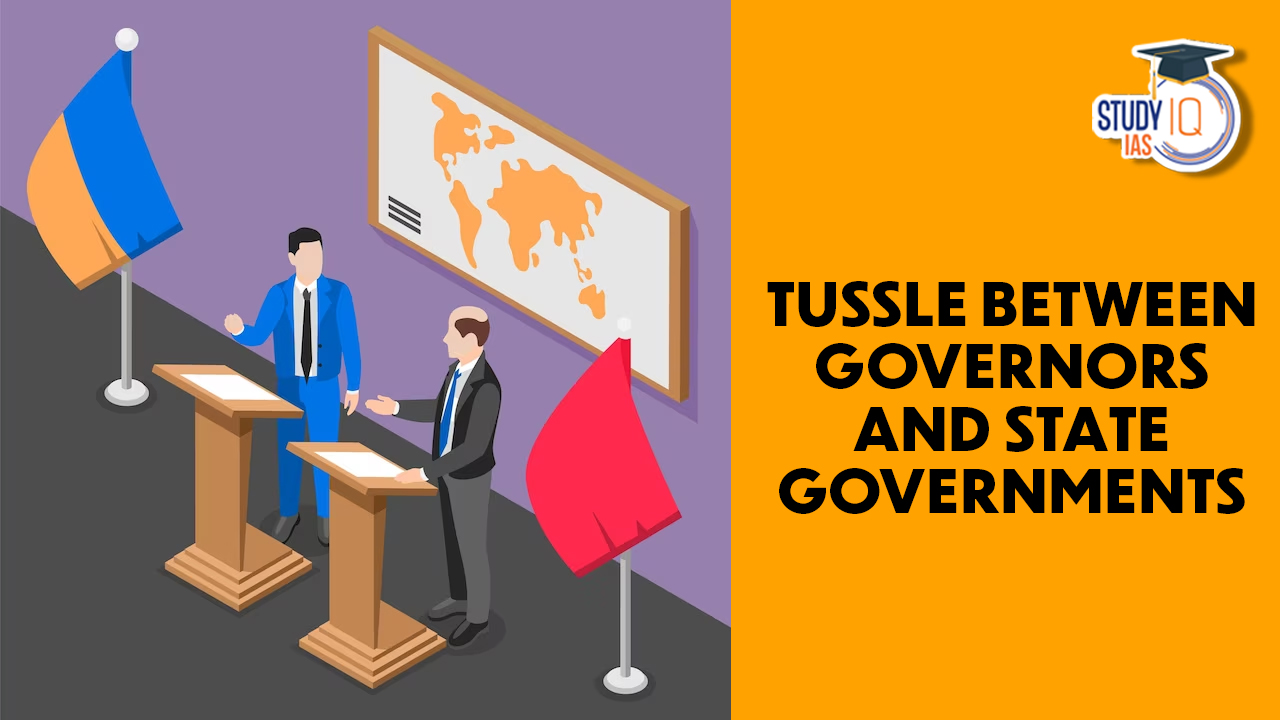Table of Contents
Context: A fresh dispute between the governor and the state government has arisen in Tamil Nadu following the governor’s controversial dismissal of a minister.
More on the News
- Recently, the Enforcement Directorate (ED) has arrested a minister from Tamil Nadu in connection with a money laundering case.
- Following the arrest, the Governor of the state has dismissed the minister from the Council of Ministers, without consulting the Chief Minister of the state.
- Later, the Governor suspended his decision and announced that he would seek advice from the Attorney General of India regarding the matter.
Dismissal of a Minister or Council of Ministers
- Constitutional provisions:
- Article 164(1) provides that the chief Minister shall be appointed by the Governor and the other Ministers shall be appointed by the Governor on the advice of the Chief Minister, and the Ministers shall hold office during the pleasure of the Governor.
- Though Ministers hold office during the pleasure of governor, but governor is bound to exercise his pleasure in accordance with the Chief Minister’s advice. Thus, it is a power of the Chief Minister against his colleagues.
- Judicial pronouncements in this regard:
- Shamsher Singh & Anr vs State of Punjab (1974): A seven-judge Constitution Bench of the Supreme Court held that the President and the Governor should exercise their formal constitutional powers only upon and in accordance with the advice of their Ministers save in a few well-known exceptional situations.
- Nabam Rebia and Etc. vs Deputy Speaker and Ors (2016): The Supreme Court cited the observations of Dr. B R Ambedkar: “The Governor under the Constitution has no function which he can discharge by himself; no functions at all. While he has no functions, he has certain duties to perform, and I think the House will do well to bear in mind this distinction.”
- So, what does the “pleasure” of the Governor mean?
- The Governor can have his pleasure as long as the government enjoys majority in the House.
- The Governor can withdraw his pleasure only when the government loses majority but refuses to quit. Then he withdraws the pleasure and dismisses it.
About the Office of Governor
| About Governor |
|
| Envisaged role of governor |
|
| Appointment of governor |
|
| Qualifications |
|
| Tenure/Removal of Governor |
|
Concerns related to the office of Governor
- Appointment/removal process: Governors hold office till the pleasure of the president as no grounds for removal is mentioned in the constitution.
- This leads to favoritism in the appointment process and well-suited candidates are ignored in favor of the less competent individuals.
- Acting as an agent of a political party at the centre: Due to favoritism in the appointment and lack of any security of tenure in the constitution, the office of governor often works as a puppet/agent of the union government instead of acting as a bridge between state and centre government.
- Misuse of discretionary powers:
- Hung assemblies: It is a situational discretion where s/he is free to invite a party/alliance to form the government in case no single party/pre-poll alliance has won the majority of the seats in the state assembly elections.
- Reserving a bill for the president’s consideration: It is his constitutional discretion to reserve certain state bills for the consideration of the president.
- Misuse of the emergency powers: Governors have often found to be recommending imposition of the president’s rule in the state on frivolous grounds, especially when the ruling party at centre is different from that of the concerned state.
- Bypassing the elected government: There have been instances when governors found to give orders to state officials directly or visit public offices without informing the state governments. This is against his/her constitutional mandate as he is only a nominal head and expected to act on the advice of the COM in the state.
Recommendations by various committees
- The Sarkaria Commission, 1983: It proposed that the Vice President of India and Speaker of Lok Sabha should be consulted by the Prime Minister in the selection of Governors.
- The National Commission to Review the Working of the Constitution, 2000: The Commission suggested that the “Governor of a State should be appointed by the President, after consultation with the Chief Minister of that State.
- The Justice Madan Mohan Punchhi Committee, 2007:
- It recommended that that a committee comprising the Prime Minister, Home Minister, Vice President, Speaker, and the concerned Chief Minister should choose the Governor.
- The Punchhi Committee recommended deleting the “Doctrine of Pleasure” from the Constitution but backed the right of the Governor to sanction the prosecution of ministers against the advice of the state government.
- It also argued for a provision for impeachment of the Governor by the state legislature.


 Serious Fraud Investigation Office (SFIO...
Serious Fraud Investigation Office (SFIO...
 Article 142 of Indian Constitution, Sign...
Article 142 of Indian Constitution, Sign...
 Pakistan-Occupied Kashmir (PoK): History...
Pakistan-Occupied Kashmir (PoK): History...





















